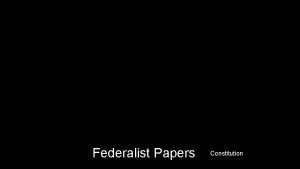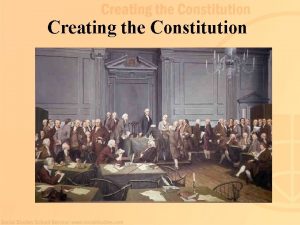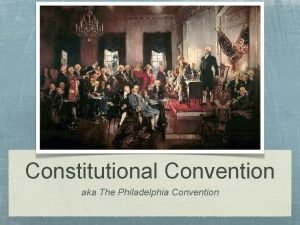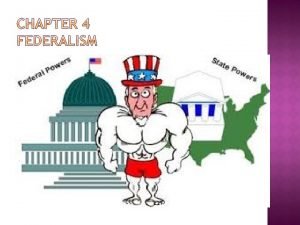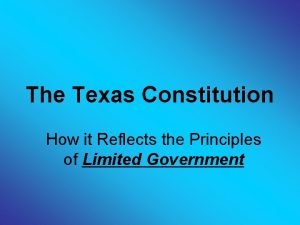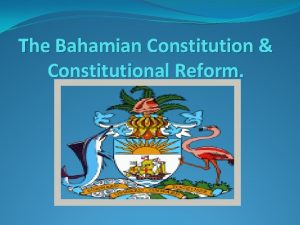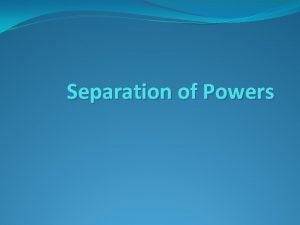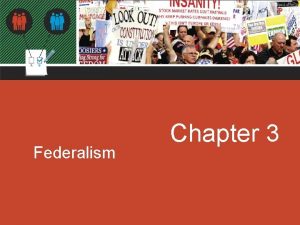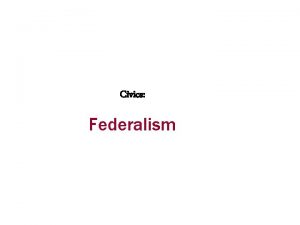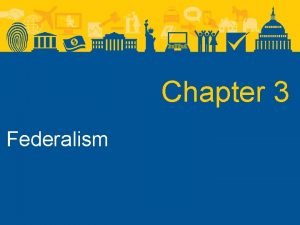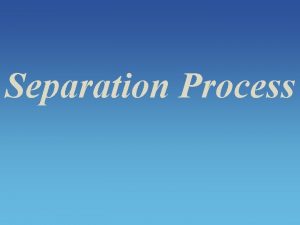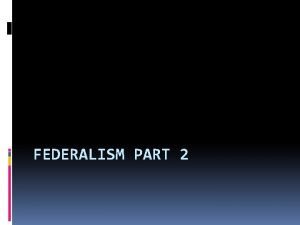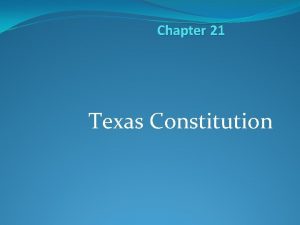Principles of the Constitution Federalism Separation of Powers











- Slides: 11

Principles of the Constitution Federalism Separation of Powers Checks and Balances Biggest Problem: Afraid of too much power in the hands of one person/group – SPREAD OUT THE POWER!

Federalism: The division of power between Federal government and state government

Federalism Enumerated Powers: Reserved Powers: Powers given only to the State Federal Government Concurrent Powers: Powers shared by both the Federal and State governments

Enforce Pass Establish Regulate Provide Govern Conduct all laws United for the elections Foreign trade apublic court public Laws necessary States and with school Affairs system safety, and commerce other system and Collect Coin and taxes Print Money Provide for the General Raise Establish Immigration alocal Support postal Laws governments system an army properand within determine countries health, territories ato and state and carry and voter welfare among admit out qualifications its within new the powers a Borrow money Welfare states Enumerated Powers Federalism Concurrent Powers Reserved Powers

Federalism

Separation of Powers - Baron de Montesquieu - Power is divided between three “branches” of government Baron de Montesquieu: French Enlightenment philosopher and political thinker (1689 -1755)

Separation of Powers Legislative Branch Executive Branch Judicial Branch Makes the Laws Enforces the Laws Interprets the Laws

Checks and Balances Each branch of government has power over the other branches to ensure that no branch has too much power

nal tio itu rial nst T nt nco me s. U Law peach res cla r Im e rts v De o cou es er sid low ents Pre m hes blis end sta s Am ges E e Jud s Mak ves dge pro h Ju ac pe Ap Im Ap Ov pro e ve Im rride s Bu pe V dg ach eto et es es App Pre A ro sid ppr ves Ve en ove Ca toe t (t s T bin s. B he rea et Ca ills nt A lls rie ties ppt Spe s st cia he l Se cas ssi e) on so f. C on gre ss Makes Laws Senate House of Representatives Declares War Regulates money, trade, Post Offices, etc. Enforces Laws Oversees Military Declares Presidential Acts Unconstitutional President Vice President Cabinet Executive Orders Makes Treaties Makes Budget Executive Agencies Interprets Laws Supreme Court Appoints Judges Grants pardons/reprieves/amnesty Appellate Courts District Courts Settles Disputes

Limiting the President -Term: 4 years - Limited to 2 Terms - Most things done by the President must be approved by the SENATE

Bill of Rights - Protects Individual Freedoms - Freedom from oppressive government - Includes basic freedoms, rights of accused people, and property rights
 Lesson 1 principles of the constitution
Lesson 1 principles of the constitution Pubilus
Pubilus Federalism in the constitution
Federalism in the constitution Federalism in the constitution
Federalism in the constitution Federalism
Federalism Federalism powers divided
Federalism powers divided Texas constitution vs u.s. constitution venn diagram
Texas constitution vs u.s. constitution venn diagram Nc constitution vs us constitution
Nc constitution vs us constitution Constitution what is constitution
Constitution what is constitution The constitution spells out the powers denied to
The constitution spells out the powers denied to Aristotle on separation of powers
Aristotle on separation of powers Separation of powers and checks and balances
Separation of powers and checks and balances

